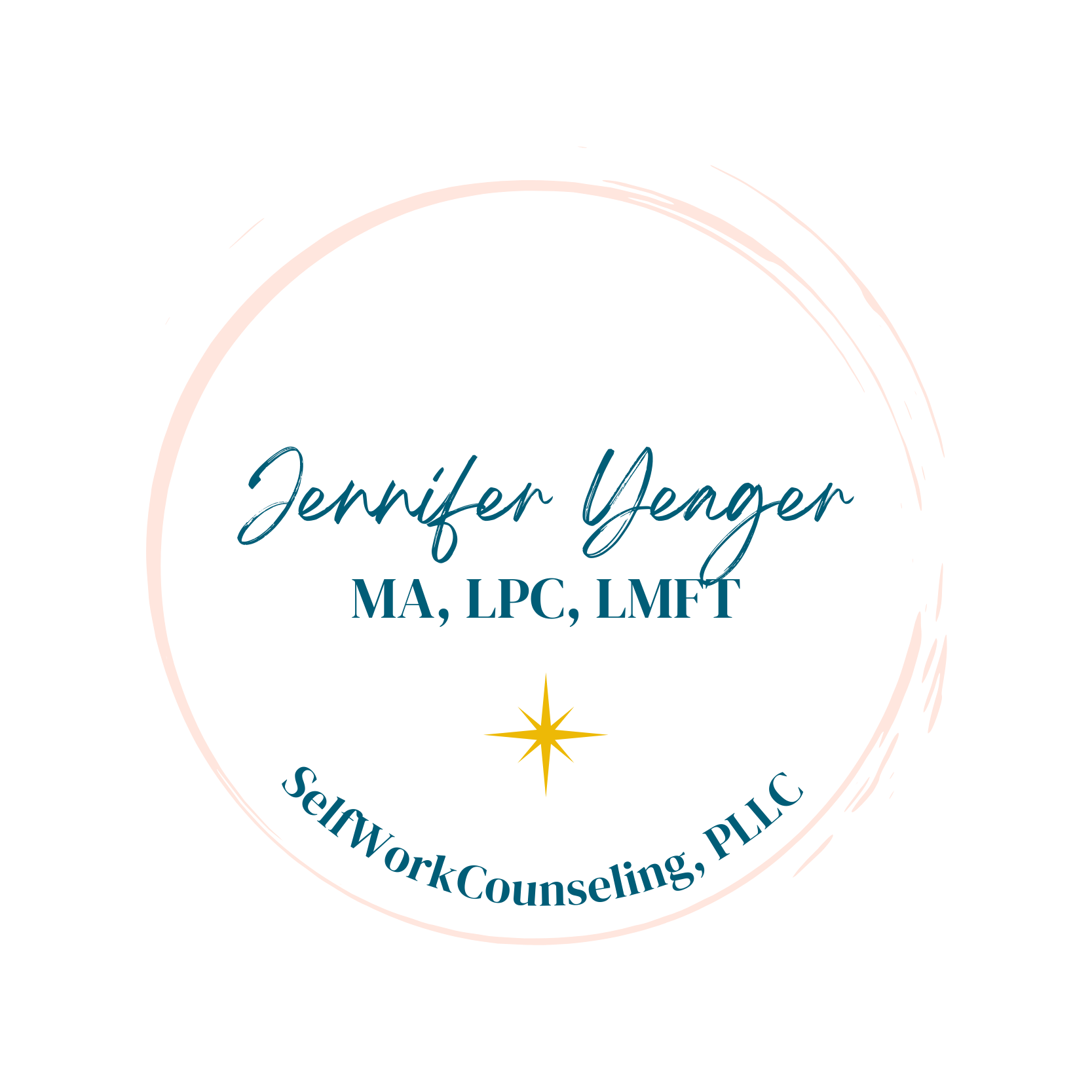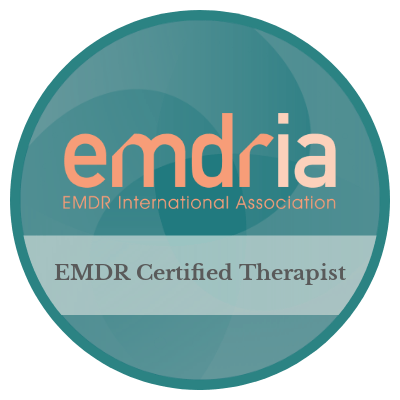About
Jennifer Yeager, MA, LMFT-S, LPC-S, CSAT
SelfWork Counseling, PLLC
Hi there, I’m Jennifer. Wife, mom of two teenage boys & two rambunctious dogs, lover of chocolate, relational trauma therapist, and founder of SelfWork Counseling, PLLC.
Relationships are the foundation of our lives. They shape who we are, how we grow, and how we heal. My journey to becoming a Licensed Marriage and Family Therapist (LMFT) and Licensed Professional
Counselor (LPC) was rooted in a deep desire to help people navigate the complexities of relationships—whether that means strengthening a marriage, overcoming trauma, or facing life’s struggles together.
Throughout my life and career, I’ve seen how even the most resilient individuals and couples can feel lost in the face of challenges like disconnection, conflict, or unhealed wounds. These moments of struggle often feel isolating, but I believe they’re also opportunities for profound growth, healing, and transformation.
As someone with both personal and professional experience in the complexities of trauma and relationships, I understand how deeply connected our emotional well-being is to the bonds we share with others. I’ve witnessed and experienced how trauma, life transitions, and relational struggles can affect not only an individual but also their most important relationships. This understanding drives me to create a safe and supportive space where individuals and couples can address the deeper issues that hold them back, rediscover connection, and move forward with renewed strength.
I chose this work because I’m passionate about helping people build lives and relationships that feel secure, fulfilling, and authentic. Whether I’m helping individuals heal from past trauma, guiding couples through marital conflict or infidelity, or empowering women to rediscover and embrace their true selves. My focus is always on fostering connection, trust, and hope while helping you find the joy that comes from building authentic, fulfilling relationships.
Who I Help
Life’s challenges can leave us feeling disconnected, overwhelmed, or stuck—especially in our most important relationships. Whether you’re navigating the complexities of marriage, recovering from betrayal, or working to overcome patterns that no longer serve you, I’m here to guide you toward a stronger, more fulfilling path.
I specialize in helping individuals and couples reconnect, rebuild, and rediscover authentic relationships and joyful lives. Using evidence-based approaches like PACT Therapy, EMDR, Internal Family Systems (IFS), and trauma-informed care, I provide compassionate support tailored to your unique needs. Together, we’ll address the challenges you’re facing and create a clear path forward.
My Approach
Growth and healing happen in a space where you feel safe, seen, and supported. My therapeutic style is COLLABORATIVE, COMPASSIONATE, AND INTENTIONAL. I bring specialized training in:
- PACT Therapy to strengthen relationships through attachment and neuroscience-informed strategies.
- Trauma-Informed Care to help you feel empowered and safe as we address difficult emotions and experiences.
- EMDR to support healing from past trauma and improve emotional resilience.
- Mindfulness-Based Practices to foster balance and calm in your daily life.
- Internal Family Systems
No matter where you are in your journey, I’m here to meet you with care, curiosity, and strategies that truly work.
Let’s Begin Your Journey
Taking the first step toward change is a courageous act. Whether you’re ready to repair a struggling relationship, process past wounds, or simply improve the way you show up in your life, I’m here to help.
Reach out today to schedule a consultation. Together, we’ll move toward a future that feels authentic, connected, and whole.
Let’s write the next chapter of your story—one of growth, healing, and hope.

Background and Education
Academic Training & Licenses
MA – Professional Counseling Dallas Baptist University
MA – Professional Development Dallas Baptist University
BBA - Bachelor of Business Administration - Finance
University of North Texas
Licensed Marriage and Family Therapist Supervisor #203091 (Texas)
Licensed Professional Counselor Supervisor #78951 (Texas)
IITAP Certified Sexual Addiction Therapist (CSAT)
EMDRIA Certified EMDR Therapist
Currently in PACT Level 1 Training
Gottman Level 1 & 2 Trained
Internal Family Systems Informed
Trauma Conscious Yoga Method Teacher
Mother Hunger with Kelly McDaniel
Discernment Counseling with William J. Doherty, PhD
Overcoming Enmeshment with Dr. Kenneth M. Adams
Professional Memberships
American Association of Marriage and Family Therapists
EMDR International Association (EMDRIA)
International Institute of Trauma and Addiction Professionals (IITAP)
Relational Therapists of Dallas
North Texas Sexual Health Providers
Sex Addiction Treatment Network
Therapy Modalities
Trauma Informed Care
What is Trauma-Informed Care?
Trauma-informed care is a compassionate approach to therapy that acknowledges the profound impact trauma can have on your mind, body, and relationships. It prioritizes safety, trust, and collaboration to help you heal at a pace that feels right for you.
In my practice, trauma-informed care integrates evidence-based methods like Eye Movement Desensitization and Reprocessing (EMDR), Internal Family Systems (IFS), and somatic therapies to support your unique healing journey.
Key Principles of Trauma-Informed Care
- Creating a Safe and Supportive Space
Your safety—physical, emotional, and psychological—is my top priority. I strive to create a space where you feel respected, understood, and empowered to explore your experiences without fear or judgment. - Understanding the Mind-Body Connection
Trauma isn’t just stored in the mind—it lives in the body. Using somatic techniques, we’ll work to gently release the physical imprints of trauma, helping you reconnect with your body and restore a sense of calm and balance. - Working with Your Inner World
Through Internal Family Systems (IFS), we explore the different parts of yourself—your emotions, thoughts, and protective patterns. Together, we’ll help those parts find harmony and heal wounds that may be holding you back. - Processing Trauma Safely
EMDR is a powerful tool for processing and resolving traumatic memories. By accessing the brain’s natural healing processes, EMDR helps reduce the emotional charge of past events, allowing you to move forward with greater clarity and peace. - Empowering Your Healing Journey
You are the expert on your life. I work collaboratively with you to set goals, explore your strengths, and build the resilience needed to thrive. Your voice and choices guide the process, ensuring therapy feels safe and empowering.
A Holistic Approach to Healing
Trauma-informed care is not a one-size-fits-all approach. By integrating EMDR, IFS, and somatic therapies, I tailor each session to meet your specific needs, honoring the interconnectedness of your mind, body, and spirit.
If you’re ready to explore how these approaches can support your healing journey, I invite you to reach out for a consultation. Together, we can create a space where growth and transformation are not only possible but deeply empowering.
ATTACHMENT THEORY
Understanding Attachment Theory
Attachment theory provides valuable insights into how our early relationships shape the way we connect with others throughout our lives. Rooted in the work of psychologist John Bowlby and expanded upon by others, this theory explores how the bonds we form in childhood influence our emotions, behaviors, and relationships as adults.
What is Attachment Theory?
At its core, attachment theory examines the emotional bonds between caregivers and children. These early connections establish patterns that impact how we seek comfort, build trust, and navigate intimacy.
Attachment styles generally fall into four categories:
- Secure Attachment:
- Developed in relationships where caregivers are consistently responsive and nurturing.
- Leads to confidence in seeking support and forming healthy, trusting relationships.
- Anxious Attachment:
- Emerges when caregivers are inconsistent—sometimes attentive, sometimes unavailable.
- May result in a heightened need for reassurance and fear of abandonment.
- Avoidant Attachment:
- Formed when caregivers are emotionally distant or dismissive.
- Can lead to discomfort with closeness and a tendency to suppress emotions.
- Disorganized Attachment:
- Often develops in the context of trauma or unpredictable caregiving.
- Creates confusion and fear in relationships, with mixed desires for connection and self-protection.
How Attachment Theory Shapes Therapy
Attachment patterns are not destiny—they are simply starting points. Therapy provides a space to explore these patterns, understand their origins, and develop healthier ways of relating to yourself and others.
In my practice, I use attachment theory to:
- Understand Your Relationship Patterns: By exploring your early experiences, we can uncover how past attachments influence your current relationships.
- Strengthen Emotional Awareness: Attachment-informed therapy helps you identify emotional needs and learn how to express them effectively.
- Cultivate Secure Connections: Together, we work to create a sense of security within yourself, fostering healthier and more fulfilling relationships.
Healing Through an Attachment Lens
Whether you’re navigating challenges in romantic relationships, friendships, or your connection with yourself, understanding attachment theory can provide profound clarity and healing.
If you’re curious about how attachment-focused therapy can support your growth, I invite you to schedule a consultation. Together, we can explore how your past shapes your present—and how you can create the connections you deserve in the future.
RELATIONAL THERAPY
Relational Therapy: Healing Connections, Strengthening Bonds
Relationships are at the heart of our lives, providing love, connection, and support. But when trust is broken, communication falters, or old wounds resurface, even the strongest relationships can struggle. Relational therapy offers a safe and compassionate space to address these challenges, fostering healthier communication, deeper understanding, and lasting connection.
In my practice, I specialize in helping couples and individuals navigate relational challenges, including those shaped by relational trauma. Using evidence-based approaches such as PACT (Psychobiological Approach to Couples Therapy), Emotionally Focused Therapy (EFT), and The Gottman Method, I support you in building stronger, more fulfilling relationships.
What is Relational Trauma?
Relational trauma occurs when trust or safety is repeatedly violated in key relationships, often in childhood or intimate partnerships. It can leave lasting imprints on how you connect, communicate, and navigate intimacy.
Symptoms of relational trauma can include:
- Difficulty trusting others.
- Fear of abandonment or rejection.
- Struggles with emotional regulation.
- Patterns of conflict or avoidance in relationships.
Relational therapy helps address these wounds, offering tools and insights to heal and build healthier connections.
Approaches to Relational Therapy
PACT (Psychobiological Approach to Couples Therapy)
PACT integrates neuroscience, attachment theory, and arousal regulation to address relational challenges, including trauma. This approach focuses on:
- Understanding how your brain and body react to relationship stress or triggers.
- Building secure attachment by fostering safety, trust, and attunement.
- Developing tools to regulate emotions and strengthen connection.
Emotionally Focused Therapy (EFT)
EFT focuses on the emotional bonds between partners, helping you:
- Identify and express vulnerable emotions tied to past or current relational trauma.
- Break free from negative cycles of disconnection or conflict.
- Rebuild a secure, loving connection that fosters healing and resilience.
The Gottman Method
Grounded in decades of research, The Gottman Method offers practical strategies to:
- Improve communication and reduce conflict.
- Repair relational ruptures, including those caused by betrayal or trauma.
- Build a shared sense of meaning, intimacy, and trust.
Healing Relational Trauma Together
Relational therapy is not just about solving surface-level issues; it’s about addressing the deeper patterns and wounds that impact your ability to connect. Whether you’ve experienced betrayal, ongoing conflict, or the ripple effects of past trauma, therapy provides a safe and structured environment to heal together.
Take the Next Step
You don’t have to navigate relational challenges alone. Whether you’re seeking to rebuild trust, recover from relational trauma, or simply enhance your relationship, relational therapy offers a path to understanding, connection, and lasting change.
If you’re ready to explore how relational therapy can support your journey, I invite you to reach out for a consultation. Let’s work together to create a relationship built on healing, trust, and love.
Let's Talk
Take your first step today. Let's find a time where we can meet and talk about what's on your mind.
Jennifer Yeager, LMFT-S, LPC-S, CSAT
TX LMFT-S - #203091
TX LPC-S #78951
SelfWork Counseling, PLLC
4324 Mapleshade, Ste. 121
Plano, TX 75093
214-702-1901
All Rights Reserved | SelfWork Counseling, PLLC



